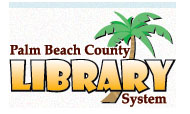The Palm Beach County Library System is providing a new way for youths to atone for their late return of materials — they now can “read down” their fines.
Library Director John Callahan presented the program for approval to the Palm Beach County Commission at its meeting Tuesday, May 6, explaining that at last year’s budget deliberations, Vice Mayor Paulette Burdick had asked that the library look at the idea of removing juvenile fines on late materials with the intent to increase reading among children and remove obstacles that might exist in terms of finances.
“After researching the subject in professional literature and contacting a number of libraries around the country who have a no-fines policy, we were unable to find any hard data that actually improved the situation,” Callahan said. “In fact, what data does exist seems to indicate there’s actually a negative correlation with no fines, and more people retain the items longer, which has the effect of making fewer materials available to the public, so we don’t recommend that.”
But because of library staff’s direct contact with library patrons, particularly those in lower-income neighborhoods, they came to realize that about 33,000 of 130,000 juvenile library cards are blocked because of fines exceeding $5.
“Juvenile fines approximate $100,000 a year, and that is actually included in our budget revenues,” Callahan said. “As an alternative to cash, however, some larger libraries — among them Louisville, Baltimore and Queens, N.Y. — have instituted a Read Down Your Fines program. The intent of the program is to restore access to children with fines while still holding them responsible for their actions.”
Under the program, a child would earn one “Dewey Book Buck” for every 15 minutes spent reading in the library under the supervision of library staff.
“The program, I think, would remove that economic burden to get the child back into the library, and hopefully reading more,” Callahan said.
The program will be available to children up to age 18, beginning with the library’s 2014 Summer Reading Program in June, and continue for one year. If the results are good, the program will continue.
“We’ll also be taking steps to revitalize our summer reading program this year with a lot more publicity,” Callahan said. “It’s going to be funded by our Friends of the Library, and, of course, libraries have traditionally held summer reading programs to try to alleviate the summer slide, which has been publicized lately.”
He said library staff would also work with the school district to publicize the program, as well as increase efforts to take the program outside the library to summer camps, recreation sites and other county locations where children gather for the summer.
Commissioner Hal Valeche asked who will select the content and how closely the children would be supervised. “Let’s assume this program gets very popular,” Valeche said. “I know there’s limited staff, but if there’s 10 kids reading at once, it’s going to take a fair amount of time.”
Callahan said the children can select the reading material, and the reading will be largely on an honor system. “It wouldn’t be that difficult to observe that they are in fact reading and not just fooling around,” he said.
Mayor Priscilla Taylor asked whether the late fees are actually being collected, and Callahan said it is unlikely that any of them will be collected.
“Essentially, they’ve reached the limit, and they don’t have the money to pay them,” Callahan said. Their parents are not ponying up, either, so this is money we would never collect anyway.”
Callahan noted that the library goes to great effort to get the books back, even if the late fees are uncollectible. “We still want the books back,” he said. “They are not going to be forgiven until they return the books.”
Commissioner Shelley Vana asked whether the program is being coordinated with the Children’s Services Council and its summer program, and Callahan said his staff is working on that.
Taylor wondered if the program might negate the importance of returning books and paying appropriate fees. “I think back when I didn’t turn a book in, I had to pay and it taught me responsibility, and I’m wondering if what we’re doing is sort of erasing that,” she said.
“I think because they have to read down the fine, they are still retaining responsibility,” Callahan said. “The other aspect that people brought to my attention was that in this county, it is difficult for a child to walk to the library. He relies on parents for transportation, so in a way, we’re kind of fining the parents rather than the child. I think the responsibility factor is still there by requiring them to do something to read down that fine.”
Burdick congratulated Callahan and his staff for being creative in trying to address late fees for children and promoting reading. “Reading is key,” she said. “It’s key to Palm Beach County’s economic development.”
Burdick made a motion to approve the program. It carried 7-0.








